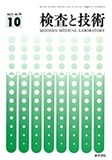Japanese
English
- 有料閲覧
- Abstract 文献概要
新しく採取した赤血球は抗体の存在下で凝集しないが,4℃に数日間抗凝固剤中に放置した同じ赤血球は同じ抗体によって通常凝集され,このような凝集効果の違いは赤血球が安定化するためであると言われてきている.このような考え方を支持するような文献も見当たらず,また赤血球の古さが凝集に影響を及ぼすとすれば,抗原抗体反応を利用する検査方法の感度に重大な意味を持つことになるため,上記の仮説を寒冷凝集反応によって検討した.便宜的に寒冷血球凝集反応が選ばれた.ここにその検討成績,従来の仮説に対する推察及びこれからの検査に対する提案を述べる.
It has been suggested that freshly obtained red cells fail to agglutinate in the presence of antibody, and that the same cells left for several days at 4C in anticoagulant will usually be agglutinated by the same antibody, erythrocyte stabilization being responsible for this differential effectiveness of agglutination.*3Since supportive documentation for this assumption is not available, and since the concept*4 of differential effectiveness of agglutination as a function of red cell age may be of great significance*5 to the sensitivity of laboratory procedures which take advantage of antigen/antibody reactions, the above hypothesis was investigated using a cold agglutination procedure as a test system. Cold hemagglutination was chosen for reasons of expediency.*6 Results of that investigation, possible explanations for the original hypothesis, and suggestions for further testing are presented here.
Copyright © 1977, Igaku-Shoin Ltd. All rights reserved.


